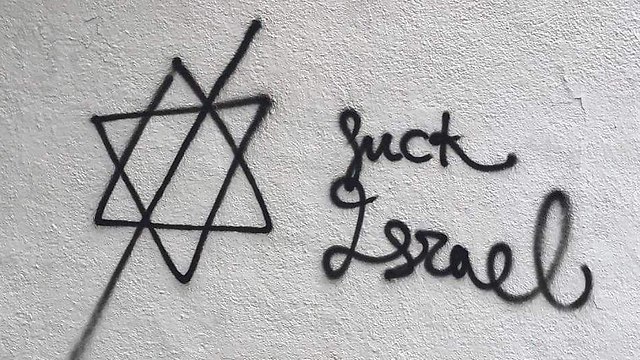
The government that cried 'wolf!'
Op-ed: The International Holocaust Remembrance Alliance's definition of anti-Semitism is problematic, as there is a difference between hatred of Jews and opposition to the policies of the Israeli government. If Israel continues to cry 'wolf,' international Jewry may find that valid cries of anti-Semitism end up falling on deaf ears.
The Israeli government’s calculated obfuscation of the line between anti-Semitism and opposition to its policies, or even opposition to the concept of a Jewish state, should be of concern to Jews worldwide.
This worrisome phenomenon was highlighted at a conference convened in Brussels earlier this month in an attempt to get European MPs to sign a text based on the International Holocaust Remembrance Alliance's (IHRA) definition of anti-Semitism, prior to European elections scheduled for May of next year. This constitutes nothing short of political blackmail, as anyone who exhibits reluctance to sign will likely face accusations of anti-Semitism at a time when they are particularly vulnerable to disinformation aimed at their electorate.
The problem lies not with the IHRA’s definition itself, which basically speaks of hatred toward Jews. It’s the illustrative examples that give one pause. Among them are “targeting the state of Israel” and “denying the Jewish people their right to self-determination.” With these phrases, the IHRA statement blurs the distinction between hatred of the Jewish people and opposition to Israeli government policies, the notion of Israel as a Jewish state, or even to the very establishment of the State of Israel.
While one can understand the Netanyahu’s government attempt to get Europe on board with this broad definition, which validates its attempts to quell the voices of opposition at home and abroad, the fact is that these three examples represent legitimate political worldviews. There are countless Jewish Israelis who support the notion of “a state for all its citizens” versus “a Jewish state,” and there are many Jews around the world who object to the establishment of the State of Israel as they perceive it as an injustice to the indigenous Palestinians who were living here at the time.
Being post- or anti-Zionist, however, does not make them anti-Semitic or, as the right-wing likes to call them, "self-hating Jews." If one accepts the IHRA definition, the most anti-Semitic group of all would be Neturei Karta, which rejects “the central heresy of Zionism” and declares that its “only loyalty is to God and His revelation.” The absurdity of labeling these devout ultra-Orthodox Jews as anti-Semitic speaks for itself.
Another example cited by the IHRA is accusing Jews of “being more loyal to Israel… than to the interests of their own nations.” This brings to mind the case of Jonathan Pollard, an American Jew who worked as a naval analyst and was caught spying for Israel. The Israeli right-wing paints him as a hero for putting Israel’s security interests above his loyalty to the United States, and successive Israeli prime ministers, beginning with Yitzhak Rabin, worked for his release. Pollard was granted Israeli citizenship in 1995, and after his release from prison, two US Representatives wrote to the Justice Department saying he would be ready to renounce his US citizenship to be allowed to immigrate to Israel. Prime Minister Netanyahu has appealed to President Trump on Pollard’s behalf, and Transportation Minister Yisrael Katz said that allowing Pollard to make aliyah would be “a gift to Israel.” According to the IHRA, however, stating the obvious—that Pollard put Israel’s interests before those of the United States—constitutes anti-Semitism.
The text presented to the EU member states also includes a call to reject BDS activities as “fundamentally anti-Semitic.” While there are undoubtedly those within the BDS movement who have no love lost for the Jews, these three activities—boycott, divestment, and sanctions—are legitimate forms of protest and constitute a tool sometimes used by the international community to achieve policy changes in countries that violate international norms. Israel’s ongoing settlement enterprise and its creeping annexation of the occupied Palestinian territories is in direct violation of UNSC Resolution 2334, which calls for differentiation “between the State of Israel and the territories occupied since 1967.” Appeals to boycott settlement products or apply sanctions to force Israel into compliance with the resolution cannot be deemed anti-Semitic by any stretch of the imagination.
There is no question that the current wave of global nationalism is contributing to a rise in anti-Semitism around the world, and a commitment by European politicians to fight this scourge would certainly be welcome; however, a clear line must be drawn between hate-mongering against Jews and political views regarding the State of Israel.
Thus, there are no grounds for the accusation leveled against US Representative Ilhan Omar by Dani Dayan, the Israeli consul-general in New York, after she tweeted that “Israel has hypnotized the world.” Substitute “Jews” for “Israel,” and he would have a point. Similarly, the parallel drawn by Naftali Bennett, the Israeli minister of diaspora affairs, between Hamas and Pittsburgh shooter Robert Bowers is groundless.
In the amended version of its charter published in 2017, Hamas clearly states that it “does not wage a struggle against the Jews because they are Jewish but wages a struggle against the Zionists who occupy Palestine.” This declaration obviously does not turn Hamas into a friendly neighbor, but firing rockets at civilian targets in southern Israel constitutes terrorism, not anti-Semitism. The Hamas charter goes on to say that “it is the Zionists who constantly identify Judaism and the Jews” with Israel and Zionism. The rhetoric of Bennett and Dayan prove them right.
The encyclopedia of the US Holocaust Memorial Museum defines anti-Semitism simply and clearly as “prejudice against or hatred of Jews.” European politicians who balk at signing on to this unambivalent definition may well be accused of anti-Semitic leanings, but if Israeli officials continue to cry “Wolf,” international Jewry may find that valid cries of anti-Semitism end up falling on deaf ears.
Susie Becher is Managing Editor of the Palestine-Israel Journal and a member of the Policy Working Group












